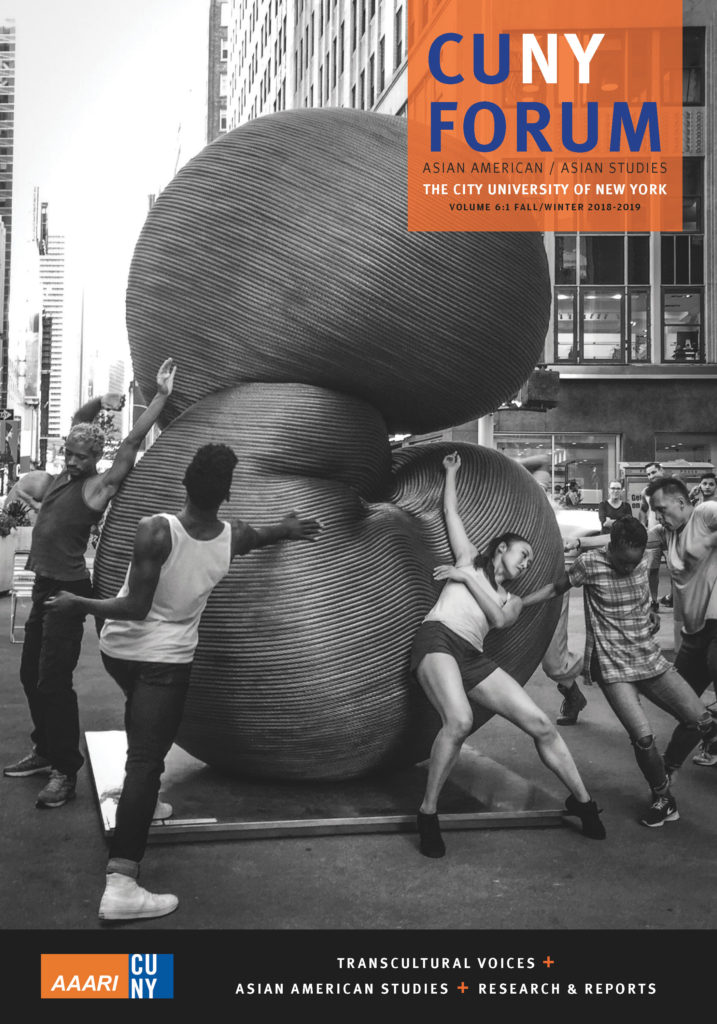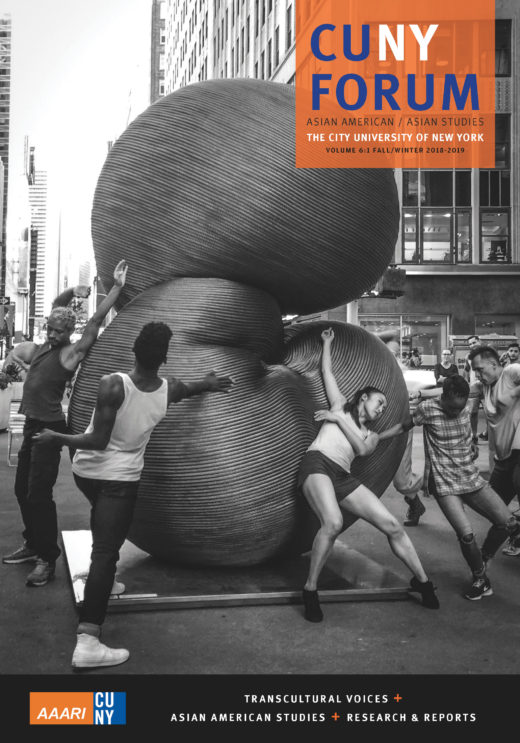
Purchase: CUNY FORUM Volume 6:1
Commemorating its sixth year of publication, the CUNY FORUM published by The City University of New York’s Asian America / Asian Research Institute (AAARI), is a cutting-edge New York-based print and on-line commons for scholars, writers, artists, and activists to create new dialogue and to promote educational change around Asian and American topics of today.
Each issue of CUNY FORUM can be utilized for classroom text usage; by researchers and students; and community, cultural and policy groups. The latest Fall/Winter 2018-2019 issue focuses on three vital areas in a post-9/11 world:
1. COMMUNITY COLLEGES AND EDUCATION IN NEW YORK CITY
In examining the building of Asian American Studies across neglected community college classrooms in New York City, Soniya Munshi (Sociology, BMCC/CUNY) and Linta Varghese (Asian/American Studies, BMCC/CUNY) report on efforts, through a grant from the National Endowment for the Humanities, to develop multiracial and multicultural models for professors within the CUNY community college system.
This new curriculum initiative involved teaching tours of NY neighborhoods including the Indo-Caribbean communities of Richmond Hill, Queens; the Asian and Latino communities of Sunset Park, Brooklyn and the mixed Latino, South Asian, Muslim, LGBTQ and Nepali and Bangladeshi communities of Jackson Heights. Modules which include multi-media content were also developed for curriculum repositories. Munshi and Varghese provide a path-breaking study of how to develop Asian American Studies for teaching multiracial working class community college students.
Also in this section, Jeffrey Arellano Cabusao (English and Cultural Studies, Bryant University) contributes a review essay on how Asian American Matters: A New York Anthology (2017) can be used as a visionary textbook for Asian American Studies classes.
2. Politics and LGBTQ History of the Filipino American Community
Research and interviews by Karen Buenavista Hanna (American Studies, Trinity College) showcased in this volume dispel the myth that Asian American success is predicated on avoiding political involvement. The Filipino American community, in particular, has had a rich history of resistance and advocacy for the expansion of workers and democratic rights, both in the U.S. and in the Philippines.
Hanna’s account, entitled “Being Gay in the KDP: Politics in a Filipino American Revolutionary Organization 1973 to 1986,” foregrounds the gay and lesbian members of this anti-Ferdinand Marcos organization. The KDP (Union of Democratic Filipinos) was unique in that LGBT individuals occupied leadership positions; yet, some were still caught between the ideology of “serving the people” and giving up their own sexuality.
Gil Mangaoang, a former member of KDP, also contributes a portion of his memoir, entitled “Life Lines: Notes from an Activist,” which chronicles his personal and political activist life, both in the Filipino American and gay community.
3. Global Literary Translation, or Modern Soft Power?
Literary translation is often utilized as a strategic tool by countries to exercise “soft power,” as well as to promote understanding between peoples and nations. This is as true in China as it is in the West. Translation Studies in the People’s Republic of China has had a long history, stretching from ancient texts to post-1949 literary translation—especially in relation to works in Chinese, English, French, and European languages.
Scholar Wang Hai Ying (Guangdong University of Foreign Studies) summarizes and describes the trajectory of translation in China, with a special feature and photos on pioneer translators, Yan Hansheng and Luo Xinxhang, who translated French texts, from the Chinese Literature Publishing House. In her essay, Wang also delineates the historical standards of literary translation in modern China, and explores the notion of “Big Translation,” whereby literary works can be translated into larger platforms including theatrical and film works.
A dramatic example of how such translation has been done in the U.S. is the fusion of image and poem provided by NY-based artist Zhang Hongtu, and the poet Mai Mang (Chinese, Connecticut University). In his poem “Van Gogh/Bodhidharma,” presented here in bilingual format, Mai Mang comments on Zhang’s morphing of both the physiology and psyche of the patriarch Bodhidharma, and Dutch-born artist Vincent van Gogh.
UCLA graduate student Hannah Nahm presents a short story, “Handcuffs,” on the mis-translation of Korean and American cultures within a family. And also in this issue, we honor the passing of noted New York poet and Distinguished Professor of English at Hunter College, Meena Alexander (1951-2018), with a poem and links to online videos of her past AAARI talks.
Asian Pacific American Timeline 1758-2018
This issue also presents the latest edition of our popular timeline, which features three centuries of the history of Asians in North America, with a focus on the East Coast.
Purchase Information
CUNY FORUM Volume 6:1 (ISSN 2329-1125, 100 pages, $15) is available for purchase online at a limited time only special sale price of $8 (includes $3 S&H). Bulk discounts are also available for schools and libraries. For review copies, please contact Antony Wong.
Online Preview: Vol 6:1
Editor-In-Chief: Russell C. Leong
Publisher: Joyce O. Moy
Assistant Publisher: Antony Wong
Proofreader: J. Mayor
Journal Design: William Tam & Antony Wong
Information Technology: Zhu-Hui Wu
Research Assistant: Claire Chun
Editorial Board:
Moustafa Bayoumi (Brooklyn College/CUNY), Luis H. Francia (Hunter College/CUNY & NYU), Kenneth J. Guest (Baruch College/CUNY), Evelyn Hu-Dehart (Brown University), Peter Kiang (UMASS-Boston), Amitava Kumar (Vassar College), Kyoo Lee (John Jay College of Criminal Justice/CUNY), Betty Lee Sung (Prof. Emerita, City College of NY/CUNY), Vivian Louie (Hunter College/CUNY), Phil T. Nash (University of Maryland-CollegePark), John Kuo Wei Tchen (Rutgers University) & David K. Yoo (UCLA)

